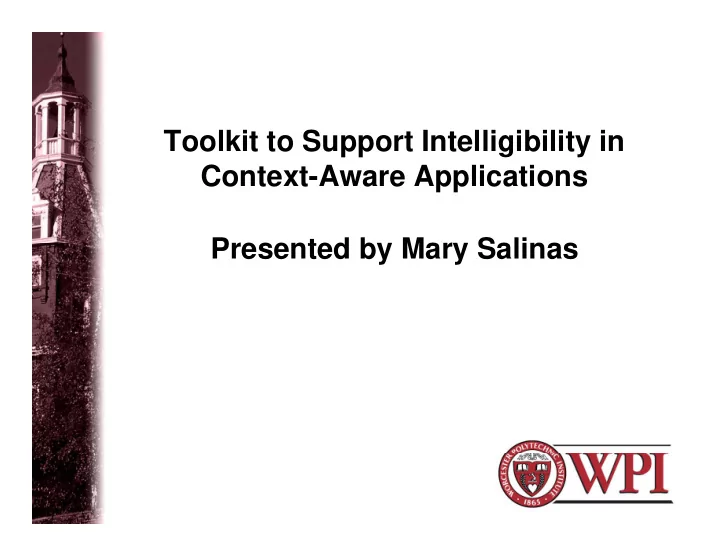

Toolkit to Support Intelligibility in Context Aware Applications Context-Aware Applications P Presented by Mary Salinas t d b M S li
What problem are they trying to solve? l ? • Context-aware applications are great for Context aware applications are great for helping users to automatically serve users better but the complexity of models can make it difficult for users to understand them. • Users can become frustrated and lose trust in the applications. Applications must be intelligible and provide explanations of context awareness context-awareness 2 2 Worcester Polytechnic Institute
What did they do? What did they do? • Created an architecture for generating a wide Created an architecture for generating a wide range of explanations including Why, Why Not, How To, What, What If, Inputs, Outputs and Certainty. • Create a library of reference implementations of explanation algorithms for 4 different models. • Provide automated support for the common P id d f h explanations to promote good design practices practices. 3 3 Worcester Polytechnic Institute
Surveyed existing use of model types d l 4 4 Worcester Polytechnic Institute
Rule-based Decision Model Rule based Decision Model • Rules are usually Rules are usually if/else logic or simple mapping • Most popular decision model. • Used in personalization, activity recognition, i i i i monitoring, location guides guides 5 5 Worcester Polytechnic Institute
Decision Tree Model Decision Tree Model • Similar to rules, but Similar to rules, but decisions are made from top down rather than bottom up. • Decision trees are built from statistical data so they can data so they can model certainty from probability of leaves probability of leaves. 6 6 Worcester Polytechnic Institute
Bayes Decision Model Bayes Decision Model • Naïve Bayes is sum Naïve Bayes is sum of evidence assumes features are independent of each other. • Includes prior probabilities of selected class value selected class value and from each feature value feature value 7 7 Worcester Polytechnic Institute
Hidden Markov Model Hidden Markov Model • Apply weights of Apply weights of evidence as similar to Bayes and include temporal factors as well 8 8 Worcester Polytechnic Institute
Implementation Implementation • Implemented in Java based on Enactor and Implemented in Java based on Enactor and Context Toolkit created by Anind. • Explainer to generate explanations for model- p g p independent types and one Explainer for each of the 4 decision model types. • Reducer to remove explanations that include too many reasons or each reason is too long. • Presenter renders the explanation in form suitable for users. Developers can build 9 9 several Presenters if needed. l P t if d d Worcester Polytechnic Institute
Architecture for Rules and Cl Classifiers ifi 10 10 Worcester Polytechnic Institute
Claimed Results Claimed Results • Allows for fast prototyping of context-aware Allows for fast prototyping of context aware applications • Provides lower barrier to providing p g explanations • Provides flexibility of using explanations y g p • Facilitate appropriate explanations automatically. 11 11 Worcester Polytechnic Institute
What has happened since then? h ? • Active development is continuing by Lim Active development is continuing by Lim at http://www.contexttoolkit.org/ • Lim’s home page: http://www.brianlim.net/ htt // b i li t/ 12 12 Worcester Polytechnic Institute
Any Questions? Any Questions? 13 13 Worcester Polytechnic Institute
Recommend
More recommend